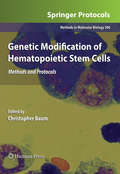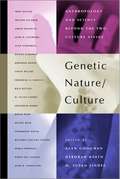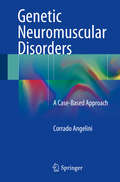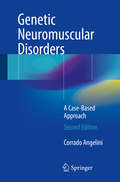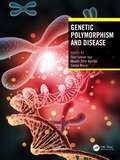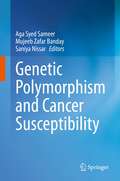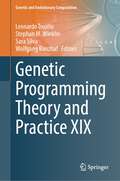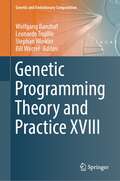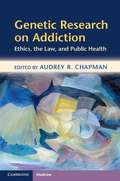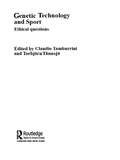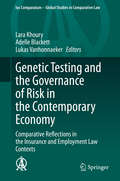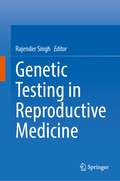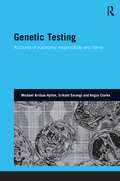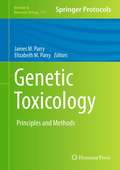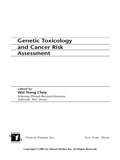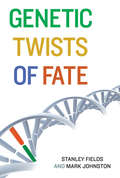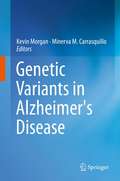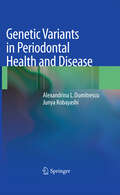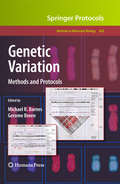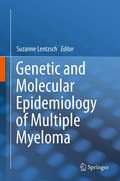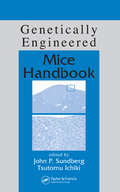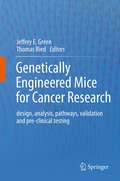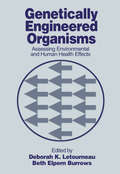- Table View
- List View
Genetic Modification of Hematopoietic Stem Cells
by Christopher BaumWith the incredible potential of gene transfer into hematopoietic stem cells, active research in this field has become critically important. In "Genetic Modification of Hematopoietic Stem Cells: Methods and Protocols", leading scientists in the field provide a compendium of protocols which cover the subject comprehensively, from the purification and culture of various types of hematopoietic cells for subsequent genetic modification by vector development and technical issues of small and large scale vector production, to the complex issue of monitoring and biosafety studies related to gene-modified hematopoiesis. Written in the highly successful Methods in Molecular BiologyTM series format, the chapters in this volume present brief introductions to the topic, lists of the necessary materials and reagents, step-by-step, readily reproducible laboratory protocols, and Notes sections, which allow the experts to highlight tips on troubleshooting and avoiding known pitfalls. Unique and cutting-edge, "Genetic Modification of Hematopoietic Stem Cells: Methods and Protocols" is an ideal, thorough resource to promote further research and the implementation of investigator-driven clinical studies using gene-modified hematopoietic cells.
Genetic Nature / Culture: Anthropology and Science Beyond the Two-Culture Divide
by Alan H. Goodman Deborah Heath M. Susan LindeeThis volume of original scholarship focuses on how anthropology is affected by and should respond to the wide range of issues associated with the culture and practice of genetics.
Genetic Neuromuscular Disorders
by Corrado AngeliniThis book describes the genetic diagnostic entities of neuromuscular disorders. Each neuromuscular syndrome is presented clinically as a case study, accompanied by text reviewing different molecular defects, DNA research and differential diagnosis. This collection of neuromuscular disorders features the different clinical phenotypes related to each genotype and are representative of the whole spectrum of a genetic muscle disorder, helping the clinician and neuromuscular physician to make a diagnosis. Key points for each genetic disease are identified to suggest treatment, when available, or the main clinical exams useful in follow-up of patients. Genetic Neuromuscular Disorders: A Case-Based Approach is aimed at neuromuscular physicians and neurology residents.
Genetic Neuromuscular Disorders
by Corrado AngeliniThis book describes the genetic diagnostic entities of neuromuscular disorders. Each neuromuscular syndrome is presented clinically as a case study, accompanied by text reviewing different molecular defects, DNA research and differential diagnosis. This collection of neuromuscular disorders features the different clinical phenotypes related to each genotype and are representative of the whole spectrum of a genetic muscle disorder, helping the clinician and neuromuscular physician to make a diagnosis. Key points for each genetic disease are identified to suggest treatment, when available, or the main clinical exams useful in follow-up of patients. Genetic Neuromuscular Disorders: A Case-Based Approach is aimed at neuromuscular physicians and neurology residents.
Genetic Polymorphism and Disease
by Mujeeb Zafar Banday Saniya Nissar Syed Sameer AgaGenetic polymorphisms are important determinants of phenotypic variations and may modulate the risk to or even cause various diseases including genetic disorders and multifactorial diseases. Genetic polymorphisms also serve as important genetic, population and evolutionary markers that allow the study of genetic and evolutionary aspects of individuals, populations and organisms and aid in tracing the evolutionary and parental lineages. Genetic polymorphisms in low penetrance genes are responsible for the alterations in the gene expression of critical signal transduction proteins and metabolic enzymes. Some of these polymorphisms are linked to increased susceptibility to various diseases especially cancers, cardiovascular diseases, immune disorders, neurological pathologies. This book collates the reviews on the roles played by polymorphisms in critical metabolic, signal transduction, cell cycle or DNA repair genes either directly or indirectly in the disease mechanisms. The focus is on various techniques for identifying the various Single Nucleotide Polymorphisms (SNPs). Polymorphism studies document the affect SNPs, and their expressions have upon the functionality of the enzymes, proteins. Key Features Describes the genetic polymorphism and its various types Discusses the role of genetic polymorphisms in modulating the risk of various human diseases Explores various molecular techniques used for detecting GPs Characterizes the role of SNPs in modulating the susceptibility of human diseases Provides a genetic basis for individual variations in response to therapeutics
Genetic Polymorphism and cancer susceptibility
by Aga Syed Sameer Mujeeb Zafar Banday Saniya NissarThis book discusses the role of genetic polymorphism in susceptibility to cancers. The book explores the understanding of differences between the genetic polymorphisms and mutations.It reviews the mechanisms underlying the effect of polymorphism in genes encoding proteins that play an essential role in metabolism, signal transduction, cell cycle, and DNA repair mechanisms. Further, it investigates various techniques that are used for analyzing the genetic polymorphisms. The book contains many chapters which summarize the importance of genetic information obtained from polymorphism-based pharmaco-genetic tests to predict better drug response and life-threatening adverse reactions to chemotherapeutic agents, help in understanding of the impact of SNPs on gene function, and gives overview of the different SNP databases for examination. This book, therefore, serves as an essential guidebook for independent researchers as well as institutions working in this specialised field.
Genetic Programming Theory and Practice XIX (Genetic and Evolutionary Computation)
by Leonardo Trujillo Wolfgang Banzhaf Sara Silva Stephan M. WinklerThis book brings together some of the most impactful researchers in the field of Genetic Programming (GP), each one working on unique and interesting intersections of theoretical development and practical applications of this evolutionary-based machine learning paradigm. Topics of particular interest for this year´s book include powerful modeling techniques through GP-based symbolic regression, novel selection mechanisms that help guide the evolutionary process, modular approaches to GP, and applications in cybersecurity, biomedicine and program synthesis, as well as papers by practitioner of GP that focus on usability and real-world results. In summary, readers will get a glimpse of the current state of the art in GP research.
Genetic Programming Theory and Practice XVIII (Genetic and Evolutionary Computation)
by Leonardo Trujillo Wolfgang Banzhaf Bill Worzel Stephan WinklerThis book, written by the foremost international researchers and practitioners of genetic programming (GP), explores the synergy between theoretical and empirical results on real-world problems, producing a comprehensive view of the state of the art in GP. In this year’s edition, the topics covered include many of the most important issues and research questions in the field, such as opportune application domains for GP-based methods, game playing and co-evolutionary search, symbolic regression and efficient learning strategies, encodings and representations for GP, schema theorems, and new selection mechanisms. The book includes several chapters on best practices and lessons learned from hands-on experience. Readers will discover large-scale, real-world applications of GP to a variety of problem domains via in-depth presentations of the latest and most significant results.
Genetic Research on Addiction
by Audrey R. ChapmanThe manner in which genetic research associated with addiction is conducted, interpreted and translated into clinical practice and policy initiatives raises important social, ethical and legal issues. Genetic Research on Addiction fulfils two key aims; the first is to identify the ethical issues and requirements arising when carrying out genetically-based addiction research, and the second is to explore the ethical, legal and public policy implications of interpreting, translating and applying this research. The book describes research guidelines on human protection issues such as improving the informed consent process, protecting privacy, responsibilities to minors and determining whether to accept industry funding. The broader public health policy implications of the research are explored and guidelines offered for developing effective social interventions. Highly relevant for clinicians, researchers, academics and policy-makers in the fields of addiction, mental health and public policy.
Genetic Technology and Sport: Ethical Questions (Ethics and Sport)
by Torbjörn Tännsjö Claudio TamburriniWill the genetic design of athletes destroy sport … or will it lead to a new and extraordinary age of athletic achievement? Exploring a new territory in sport and ethics, this edited collection contains some of the best new writing that has emerged from the debates concerning the uses of genetic technologies to improve sport performance. Issues covered include: * gene technology and sports ethics* genetic testing in sports* gene technology and the sporting ethos* gene technology and gender equality in sport. This cutting-edge text is the first on the subject to analyze gender specific questions that arise from genetically modified sport and is likely to provoke further debate in the world of sport and bio-ethics. Contributors include Lincoln Allison, Ruth Chadwick, Arne Ljungqvist, Andy Miah, Christian Munthe, Bengt Saltin, Angela Schnieder and many more.
Genetic Testing and the Governance of Risk in the Contemporary Economy: Comparative Reflections in the Insurance and Employment Law Contexts (Ius Comparatum - Global Studies in Comparative Law #34)
by Lara Khoury Adelle Blackett Lukas VanhonnaekerThis book addresses emerging questions concerning who should bear responsibility for shouldering risk, as well as the viability of existing and experimental governance mechanisms in connection with new technologies. Scholars from 14 jurisdictions unite their efforts in this edited collection to provide a comparative analysis of how various legal systems are tackling the challenges produced by the legal aspects of genetic testing in insurance and employment. They cover the diverse set of norms that surround this issue, and share insights into relevant international, regional and national incursions into the field. By doing so, the authors offer a basis for comparative reflection, including on whether transnational standard setting might be useful or necessary for the legal aspects of genetic testing as they relate to the insurance and employment contexts. The respective texts cover a broad range of topics, including the prevalence of genetic testing in the contexts of insurance and employment, and policy factors that might affect this prevalence, such as the design of national health or social insurance systems, of private insurance schemes or the availability of low-cost direct-to-consumer genetic testing. Further, the field of genetics is gaining in importance at the international and regional levels. Relevant concepts – mainly genetic tests and genetic data/information – have been internationally defined, and these definitions have influenced definitions adopted nationally. International law also recognizes a “special status” for human genetic data. The authors therefore also consider these definitions and the recognition of the special status of human genetic data within regional and national legal orders. They investigate the range of norms that specifically address the use of genetic testing in employment and insurance, encompassing international sources – including human rights norms – that may be binding or non-binding, as well national statutory, regulatory and soft-law mechanisms. Accordingly, some of the texts examine general frameworks relevant to genetic testing in each country, including those that stem from general anti-discrimination rules and norms protecting rights to autonomy, self-determination, confidentiality and privacy. In closing, the authors provide an overview of the efficiency of their respective legal regimes’ approaches – specific and generalist – to genetic testing or disclosure of genetic information in the employment or insurance contexts, including the effect of lack of legal guidance. In this regard, some of the authors highlight the need for transnational action in the field and make recommendation for future legal developments.
Genetic Testing in Reproductive Medicine
by Rajender SinghThis textbook illustrates the importance and significance of molecular genetic testing in reproductive disorders. The present book covers the genetic testing in various reproductive system anomalies, including disorders of sexual development, male infertility (Y deletions, autosomal mutations, sperm DNA fragmentation), female infertility (PCOS and POF), mitochondrial DNA testing for oocyte quality, recurrent pregnancy loss, pre-term birth, endometrial receptivity, prenatal genetic screening, reproductive carrier screening, preimplantation genetic screening, endometrial cancer, cervical cancer and other related reproductive health disorders. Microbiome testing and its contribution to genetic testing in reproductive medicine are also discussed. Genetic testing in some of these has already come into practice, genetic testing for others is established but not clinically practiced, and genetic testing for others is yet in infancy as there is only limited data available. For the disorderswhere sufficient genetic data to undertake genetic testing is not available, we have tried to put together the evidence for proposing such tests in the near future. Apart from this, the book also covers ethical, moral and technical challenges in genetic testing in reproductive medicine. The book aims to set up a standard with regard to genetic testing in the reproductive medicine field, encourage further data generation, and provide food for thought in the areas of lacunae. The book serves graduate students, researchers, clinicians, professors, and patients in the field of reproductive medicine.
Genetic Testing: Accounts of Autonomy, Responsibility and Blame (Genetics and Society)
by Srikant Sarangi Michael Arribas-Ayllon Angus ClarkeAdvances in molecular genetics have led to the increasing availability of genetic testing for a variety of inherited disorders. While this new knowledge presents many obvious health benefits to prospective individuals and their families it also raises complex ethical and moral dilemmas for families as well as genetic professionals. This book explores the ways in which genetic testing generates not only probabilities of potential futures, but also enjoys new forms of social, individual and professional responsibility. Concerns about confidentiality and informed consent involving children, the assessment of competence and maturity, the ability to engage in shared decision-making through acts of disclosure and choice, are just some of the issues that are examined in detail.
Genetic Toxicology
by James M. Parry Elizabeth M. ParryThe evaluation of potential mutagenic activity is a critical step in the assessment of the safety of both new and pre-existing chemical types. In Genetic Toxicology: Principles and Methods, expert contributors help to satisfy the demand for education in this tremendously important area of study. The volume covers three basic areas: the scientific basis of the discipline, the methodologies of the main test assays, and the application of the methods, all aimed primarily at scientists in the safety departments of the industries working with both natural and synthetic chemicals. Written in the highly successful Methods in Molecular BiologyTM series format, chapters include introductions to their respective topics, lists of the necessary materials and reagents, step-by-step, readily reproducible laboratory protocols, and tips on troubleshooting and avoiding known pitfalls. Intuitive and cutting-edge, Genetic Toxicology: Principles and Methods provides crucial support to both laboratory workers in providing quality information on the appropriate application of techniques and to study directors in their assay selection and protocol design in this vital field.
Genetic Toxicology and Cancer Risk Assessment
by Wai Nang ChoyPresents state-of-the-art regulatory cancer risk assessment models including a biologically based model for two-hit carcinogenesis and cell proliferation!This book comprehensively reviews the various roles of genetic toxicology in human cancer risk assessment conducted by United States and worldwide regulatory agencies-discussing hazard ide
Genetic Twists of Fate
by Mark Johnston Stanley FieldsHow tiny variations in our personal DNA can determine how we look, how we behave, how we get sick, and how we get well.News stories report almost daily on the remarkable progress scientists are making in unraveling the genetic basis of disease and behavior. Meanwhile, new technologies are rapidly reducing the cost of reading someone's personal DNA (all six billion letters of it). Within the next ten years, hospitals may present parents with their newborn's complete DNA code along with her footprints and APGAR score. In Genetic Twists of Fate, distinguished geneticists Stanley Fields and Mark Johnston help us make sense of the genetic revolution that is upon us.Fields and Johnston tell real life stories that hinge on the inheritance of one tiny change rather than another in an individual's DNA: a mother wrongly accused of poisoning her young son when the true killer was a genetic disorder; the screen siren who could no longer remember her lines because of Alzheimer's disease; and the president who was treated with rat poison to prevent another heart attack. In an engaging and accessible style, Fields and Johnston explain what our personal DNA code is, how a few differences in its long list of DNA letters makes each of us unique, and how that code influences our appearance, our behavior, and our risk for such common diseases as diabetes or cancer.
Genetic Variants in Alzheimer's Disease
by Kevin Morgan Minerva M. CarrasquilloAlzheimer's Disease is the most common form of dementia. The disease is characterised by the loss of synapses and neurons in the cerebral cortex and certain subcortical regions. In the last three years, the genetics of Alzheimer's Disease has made significant advances; in fact, one could argue more than in the previous two decades. This has resulted in the identification of nine new genes and perhaps more importantly the realization that new pathways could be involved in the pathogenesis of Alzheimer's. These new pathways are now legitimate targets for therapeutic intervention, which can possibly lead to treatment or a possible cure. The aim of this book is to put all of the recent genetic data on these new genes into context. Different genetic variants will be discussed, as well as biomarkers and future possibilities.
Genetic Variants in Periodontal Health and Disease
by Alexandrina L Dumitrescu Junya KobayashiPeriodontitis is a complex, multifactorial disease and its susceptibility is genetically determined. The present book systematically reviews the evidence of the association between the genetic variants and periodontitis progression and/or treatment outcomes. Genetic syndromes known to be associated with periodontal disease, the candidate gene polymorphisms investigated in relation to periodontitis, the heritability of chronic and aggressive periodontitis, as well as common guidelines for association studies are described. This growing understanding of the role of genetic variation in inflammation and periodontal chronic disease presents opportunities to identify healthy persons who are at increased risk of disease and to potentially modify the trajectory of disease to prolong healthy aging. The book represents a new concept in periodontology with its pronounced focus on understanding through knowledge rather than presenting the presently valid answers. Connections between genetics and periodontology are systematically reviewed and covered in detail.
Genetic Variation
by Michael R. Barnes Gerome BreenWith the continuing advances in sequencing technologies and the availability of thousands of distinct human genomes, we are fast approaching the day when "personal genomes" become a standard study measure and a routine component of personal health records. In Genetic Variation: Methods and Protocols, expert researchers address the rising importance of genome variation, both at the level of the individual and in population-based studies of disease, with a collection of detailed protocols reflecting the nature and impact of genetic variation on human phenotypes. The contributions cover a majority of the most important forms of genetic variation studied today, including single nucleotide polymorphisms (SNPs), insertions/deletion (indels), copy number variation (CNVs), variable number tandem repeats (VNTRs), mitochondrial variation, mobile elements, and epigenetic variation. As a volume in the highly successful Methods in Molecular BiologyTM series, chapters include introductions to their respective topics, lists of the necessary materials and reagents, step-by-step, readily reproducible laboratory protocols, and notes on troubleshooting and avoiding known pitfalls. Convenient and cutting-edge, Genetic Variation: Methods and Protocols aims to bring bench scientists, clinicians, and bioinformaticians together in order to aid progress toward a greater understanding of the full impact of variation on human health and disease.
Genetic and Molecular Epidemiology of Multiple Myeloma
by Suzanne LentzschMultiple myeloma is a plasma cell malignancy characterized by complex heterogenous cytogenetic abnormalities that accounts for 1.4% of all cancers, and approximately 10% of hematologic malignancies. The clinical manifestations of multiple myeloma include lytic bone lesions, cytopenia, hypercalcemia, renal dysfunction, hyperviscosity of the blood, immunodeficiency, and peripheral neuropathy. Based on the clinical and genetic data, probably all cases of multiple myeloma arise from an asymptomatic monoclonal gammopathy of unknown significance. The exact mechanism of the transition from MGUS to overt multiple myeloma is still not well understood. Recent oncogenomic studies have further advanced our understanding of the molecular pathogenesis of multiple myeloma. This book will give a comprehensive overview of the genetic and molecular epidemiology of multiple myeloma in order to get a more refined and conclusive understanding of this disease.
Genetically Encoded Functional Indicators
by Jean-René MartinIn the last decade, several different optical imaging techniques, either based on various voltage or calcium dyes, or more recently on modified fluorescent or bioluminescent proteins (genetically encoded) that are sensitive to calcium, have been developed to study neuronal activity, and especially groups of neurons, with the goal of mapping and deciphering the neural code underlying major neurophysiological functions. Genetically Encoded Functional Indicators brings together expert contributors to present the development of recent genetic techniques that allow for generating genetically encoded activity sensors in order to investigate neuronal activity. Each chapter describes a specific sensor and its utilization to study neuronal activity in a particular way. Written in the Neuromethods series style, chapters contain the kind of key description and implementation advice that guarantees successful results. Helpful and easy to use, Genetically Encoded Functional Indicators aims to inspire students and researchers and to serve as a useful guide to those who wish to start using these different brain imaging techniques and require a bit of guidance in how best to choose a technique to match the goal of their study.
Genetically Engineered Mice Handbook (Research Methods For Mutant Mice)
by John P. Sundbeg Tsutomu IchikiThis comprehensive book covers all aspects of the field of genetically engineered laboratory mice, including the creation of mutant mice through mouse models for developmental biology and the monitoring of laboratory mouse colonies. Written by leading biomedical investigators, pathologists, and clinicians, this book presents systematic approaches for analyzing mutant laboratory mice for specific medical applications. It provides a variety of methods for creating mutant mice, while covering legal aspects of mutant and inbred laboratory mice as well as the use and maintenance of international databases.
Genetically Engineered Mice for Cancer Research
by Jeffrey E. Green Thomas RiedGenetically-engineered mouse models for cancer research have become invaluable tools for studying cancer biology and evaluating novel therapeutic approaches. This volume focuses on state-of-the-art methods for generating, analyzing and validating such models for studying aspects of human cancer biology. Additionally, these models are emerging as important pre-clinical systems in which to test cancer prevention and therapeutic strategies in order to select compounds for testing in clinical trials.
Genetically Engineered Organisms: Assessing Environmental and Human Health Effects
by Deborah K. Letourneau Beth Elpern BurrowsGenetic engineering suggests new avenues for constructing useful products, but it also poses hazards to the health of the environment and the public. Delineating those hazards is complicated, difficult, and important at every level of risk assessment and risk management decision-making. Risk assessment and risk management may be further complicated
Genetically Engineered Toxins
by Arthur E. FrankelPresenting all preclinical and clinical information available on genetically engineered toxins, this unique, single-source reference provides the most up-to-date methods and practical examples for conducting clinical studies in toxin molecular biology.;Reviewing difficult problems and their solutions, Genetically Engineered Toxins discusses techniques for clo;ning, expressing, and purifying recombinant toxins and genetically modified recombinant toxins; documents structure-function relationships in toxins, including comparative information; supplies theory and illustrations of chimeric toxins; delineates the preclinical assessments of new reagents; and summarizes approaches to drug design.;With over 1100 literature citations, Genetically Engineered Toxins is an invaluable resource for biochemists, molecular biologists, biotechnologists, pharmacologists, toxicologists, X-ray crystallographers, enzymologists, oncologists, hematologists, immunologists, rheumatologists, botanists, and graduate-level students in molecular biology, biotechnology, and clinical oncology courses.
